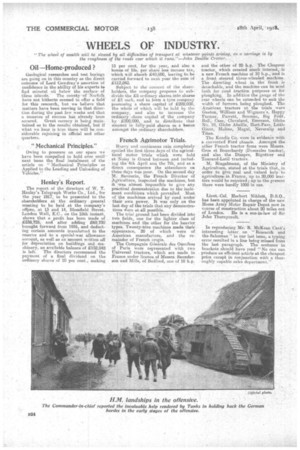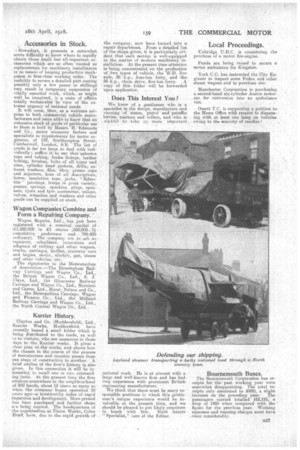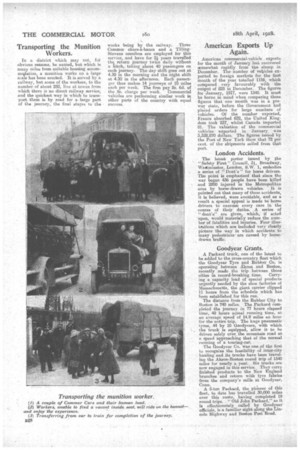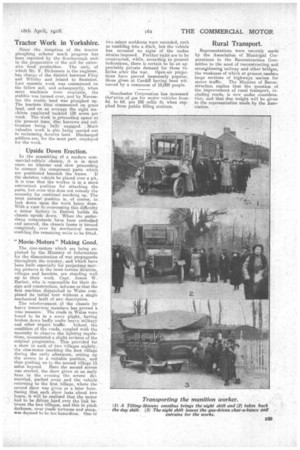WHEELS OF INDUSTRY.
Page 4

Page 5

Page 6

Page 7

If you've noticed an error in this article please click here to report it so we can fix it.
The wheel of wealth will be slowed by all digie,ulties of traltsport at whatetier points arising, as a carriage is by the roughness of the roads over which it rans."—John Beattie Crozier.
Oil—Home-produced ? •
Geological researches and test borings are going on in this country as the direct outcome of Lord Cowdray's assertion of confidence in the ability of his experts to find mineral oil below the surface of these islands. The county ofNorfolk have nf, hitherto seemed to offer a. field for this research, but we believe that matters have been moving in that direction during the past few weeks and that a measure of success has already been
secured. Great secrecy is being maintained as to the results obtained, but if what we -hear is true there will be considerable rejoicing in official and other quarters.
"Mechanical Principles."
Owing to pressure on our space we have been compelled to hold over until next issue the final instalment of the article on Mechanical Principles as Applied to the Loading and Unloading of Vehicles."
. Henley's .Report.
The report of the directors of W. 1'. Henley's Telegraph Works Co., Ltd-, far the year 1917, to be presented to the shareholders at the ordinary general meeting, to be held at the company's offices, at 13 and 14, Blomfielci Street, Loiadon Wall, E.C-, on the 19th instant, shows that a profit has been made of £238,725, and after adding £69,730 brought forward from 1916, and deducting certain amounts transferred to the reserve and to a special-wac allowance account, as well as an amount written off for depreciation on buildings and machinery, an available balance of £152,042 is left. The directors recommend the payment of a final dividend on the ordinary shares of 10 per cent., making
15 per cent. for the year, and also a bonne of 10s. per share less income tax, which laiil absorb £40,000, leaving to be carried forward to next year the sum of £112,042.
Subject to the consent of the shareholders, the company proposes to subdivide the £5 ordinary shares'. into shares of LI each, and to form a tyre company possessing a share capital of £200,000, the whole of which will be held by tire company, and also to increase the ordinary share capital of the company by £200,000, and to distribute that amount in fully-paid shares as a bonus arriongst the ordinary shareholders.
French Agrimotor Trials.
1-leavy and continuous rain completely spoiled the first three days of the agricultural motor trials which were held at Noisy Is Grand between and including the 4th April and the 7th, and as a direct consequence the attendauceon these days was poor. On the second day M. Savourin, the French Director of Agriculture, Inspected the machines, but it was almost impossible to give any practical demonstration due to the inclement conditiona which prevailed. Most of the machines arrived by road under their own power. It was only on the last day of the trials that any demonstrae tions *ere at all possible.
The trial ground had been divided into tato fields, one for the lighter class of machines and the other for the heavier types. Twenty-nine machines made their appearance, 20 of which were of American manufacture, and the re, maiuder of French origin.
The Compagnie Ca;nerle des Omnibus of Paris were represented with two Universal tractors, which are made in France under licence of Messrs. Saunderson and Mills, of Bedford, one of 10 h.p. and the other of 20 h.p. The Chappell tractor, which created ninth interest,.is a new French machine of 10 h.p., and is a front steered three-wheeled machine. The directing wheel in the front is detachable, and the machine can be used bOth for road_ traction purposes or for ploughing. In addition the gauge of the rear wheels can be extended to suit the width of furrows being ploughed. The American tractors atthe trials were Gaston, William and Wigmore'a, Happy Farmer, Parrett, Beeman, Big Four, Bull, Case, Cleveland, Emerson, Globe No.. 10, Globe Abeille, Hart-Parr, Little Giant, Moline, Mogul, Neverslip and Titan.
The Kendis Co. were in evidence with a converted Ford chassis. Amongst the other French tractor firms were Messrs, Gros at Bourchartly (Dessaules tractor), and also the Dienpre, Rigottier and Triurand-Latil tractors.
M. Ringelmann, of the Ministry of Agriculture, stated at the trials that, in order to give real and valued help to asriculture in France, up to 20,000 la-actors would be required; up to the present there were hardly 1000 in use.
Lieut.-Col. Herbert Niblett, D.S.O., has been appointed in charge of the new Home Army Motor Repair Depot now in course of construction about 20 miles out of London. He is a son-in-law of • Sir John Thornycroft.
In reproducing Mr R. McKean Cant's interesting letter on " Research and this Salesman" in our feat issue, a typing error resulted in a line being missed from the last paragraph. . The sentence in. brackets should have read " No one can produce an efficient article at the cheapest price except in eonjunction with a thoroughly capable sales department."
Accessories in Stock.
Nowadays, it presents a somewhat acute difficulty to know where to rapidly (Main those small but all-important ex-. cessories Which are so often wanted as replacements for maahinery insitallations or as means of keeping produetive flieChanism iii first-Class 'working order." The' inability to secure a detailed part Costing possibly only a few pence • or shillings may result in temporary -suspension of vitally essential work, which, as Might well be imagined; isa state of affairs totally undesirable In view of -the ex
treme urgency of national needs. _
It will come, then; as a Weldeme surprise to both commercial vehiele Manufacturers and users alike to know that an extensive stock of 'goods Of particular use to them is held by Messrs. It Edmonds and Co., motor accessory factors and specialists in'requireinenta for motor engineers, of 123; Southampton Street; CaMberwell, London; S.-E: The 'list of goods is far too large to deal with individually ; suffice it-to say That asbestos Cape _and tubing, brake linings, leather belting, breshes, bolts of all _types and sizes, cylinder lead gaskets, drills, exhaust washers, .fiies,' fibre; grease ..cps and injectors, lose Of all descriptions. horns, insulation tape, jacks,.
tite " jointings, larnps.in great variety, pumps, springs, sparking plugs, spanners, types and tyre accessories; unions, valves, wrenches and washers and other goods can be supplied ex stock.
Wagon Companies Combine and Form a Repairing Company.
Wagon Repairs, Ltd., has just been registered with a nominal,' capital of £1,250,000 in 21 shares .(500,000,7 cumulative preference and . 750,000
ordinary). The company ire to :as repairers; rebuilders, renovators and adapters of railway and other wagens, trucks, carriages, trollies, tramway cars and bogies, motor, electric, gas, steam and other vehicles, etc.
The signatories to the Memorandum of Association :—The Birmingham Railway Carriage and Wagon Co., Ltd., the British Wagon Co., Ltd' . S. .1. Claye, Ltd., the Gloucester Railway Carriage and Wagon Co.' Ltd„ Harrison and Camm, Ltd., Hurst, Nelson and Co., Ltd., the Metropolitan Carriage. Wagon and Finance Co., Ltd., the Midland Railway Carriage and Wagon Co., Ltd., the North Central Wagon Co., Ltd.
Karrier History.
Clayton and Co. (Huddersfield}, Ltd., Karrier Works, Huddersfield, have recently issued a small folder which is being distributed to the trade, as well os to visitors, who are numerous in these days to the Karrier works. It gives a clear plan of.the works, and shows how the chassis in the course of the process of manufacture and erection passes from one stage of construction to another. A brief outline of the firm's history is also given. In this connection it will be interesting to recall one or two outstanding facts. At the present time the firm employs somewhere in the neighbourhood of EDO hands, about 15 times as many as when the company began operation 10 years ago—a trustworthy index of rapid expansion and development. More ground has been purchased and further shops a-re being erected. The headquarters of the organization at Union Works, Colne Road, haV,e, due to the rapid growth of the company, now been turned into a repair department. From a detailed list of the shops given, it is particularly evident that each section 13 well-equipped in the matter of modern machinery installation. At the present time attention is being concentrated on the production of two types of vehicle, the W.D. live
• axle, 50 h.p., _four-ton lorry, and the
50 lip., chain drive, five-ton lorry. A 'copy of this folder will be forwarded upon application.
Does This Interest You ?
We know of a gentleman who -is a. specialist in the design, manufacture and running of steam, petrol and paraffin lorries, tractors and rollers, and who is wishful to take' op more important, national work. He is at present with a large and well-known firm and has had long experience with prominent British engineering manufacturers.
We think that there must be many responsible positions in which this gentleman's unique experience would be invaluable at the present time, and we should be pleased to put likely enquirers in touch with him. Mark letters " Specialist,'? care Of the Editor.
Local Proceedings.
Uxbridge U.D.C. is considering the purchase of a motor fire-engine.
Funds are being raised to secure a motor ambulance for Kingston.
York C.C. has instructed the City Engineer to inspect some Foden and other steam wagons and to purchase one.
Manchester Corporation is purchasing a second-hand six-cylinder Austin motorcar, for conversion into an ambulance
Ossett T.C. is supporting a petition to the Home Office with respect to dispensing with at least one lamp on vehicles owing to the scarcity of candles !
Bournemouth Buses.
The Bournemouth Corporation bus receipts for the past working year were somewhat disappointing. The total receipts only amounted to 2920, a slight increase on the preceding year. The passengers carried totalled 162,185, a drop of 1483 when Compared with the figure for the previous year. Working expenses and running charges must have .risen considerably.
Transporting the Munition Workers,
In a district which may not, for obvious reasons, be named, but, which is many miles from suitable housing accommoelation, a munition works on a large scale has been erected. It is served by a railway, but some of the workers, to the number of about 250, live at towns from which there is no direct railway service, and the quickest way in which to trans. port them is by road for a large part of the journey, the final stages to the
works being by the railway. Three Commer chars-a-bancs and a TillingStevens omnibus are employed for this service, and have for 2i years travelled the return journey twice daily without a Flitch, taking about 40 passengers on each journey. The day shift goes out at 4.30 in the morning and the night shift at 4.30 in the afternoon. Each passenger thus snakes 14 journeys of 10 miles each per week. The firm pay 2e. 6d. of the Be. charge per week. Commercial vehicles are performing similar work in other parts of the country with equal success.
American Exports Up Again.
American commercial-vehicle exports for the month of January last recovered somewhat rapidly from the slump in December. The number of vehicles exported to. foreign markets for the first month of the year totalled 1156, which compared very favourably with the output of 825 in December. The figures for January, 1917, were 1340.It mast be borne in mind when comparing these figures that one month was in a prewar state, before the Government had placed orders for large numbers of vehicles. Of the number exported, France absorbed 622, the United Kingdom took 237, whilst Canada imported 8L The valuation of the commercial vehicles exported in January was 3,328,870 dollars. The figures issued by the Port of New York show that 72 per cent, of the shipments sailed from that port.
• London Accidents.
The latest poster issued by the "Safety First" Council, 31, Broadway, Westminster, London, S.W. 1, embodies a series of "Dont'e " for horse drivers. The point is emphasized that since the war began 436 people have been killed and 2800 injured in the Metropolitan area by horse-drawn vehicles. It is pointed out that many of these accidents, it is believed, were avoidable, and as a result a special appeal is made to horse drivers to exercise every care in the course of their duties. A series of " dont's" are given, which, if acted -upon, would materially reduce the number of fatalities and injuries. Four Hinzteations which are included very clearly picture the way in which accidents to many pedestrians' are caused by horsedrawn traffic.
Goodyear Grants.
A Packard truck, one of the latest to be added to the cross-country fleet which the Goodyear Tyre and Rubber Co. is operating between Akron and Boston, recently made the trip between those cities in record-breaking time. Carrying a capacity load of special products urgently needed by the shoe factories of Massachusetts, the giant. carrier clipped 11 hours from the schedule which has been established for this run.
The distance from the Rubber City to Boston is 740 miles. The Packard completed the journey in 77 hours elapsed time, 49 hours actual running time, at an average speed of 14.9 miles an hour for the entire trip. The huge pneumatic tyres, 44 by 10 Goodyears, with which the truck is equipped, allow it to be driven safely over the mountain road at a speed 'approaching that of the normal running of a touring-car. The Goodyear Co. was one of the first, to recognize the feasibility of inter-city hauling and its trucks have been traveling the Akron-Boston round trip of 1540 miles for nearly a year. Six trucks are now engaged in this service. They carry finished products to the New England branches and return with tyre fabrics from the company's mills at Goodyear, Conn,
A 5-ton Packard, the pioneer of this fleet., to date has travelled 30,000 miles over this route, having completed 19 round trips. "Old John Packard," as it is affectionately called by Goodyear officials, is a familiar sight along the Lincoln Highway and Boston Post Reed.
Tractor Work in Yorkshire.
Since the inception of the tractor ploughing scheme much progress has been reported by the Scarborough unit. in the preparation of the soil for extensive food production. The unit, of which Mr. Ir. Dickenson is the engineer, 'has charge of the district between Filey ana Whitby and inland to Snainton. Last summer -work was commenced on the fallow soil, and subsequently, when more machines were available, the stubble was turned over, and by November the arable land was ploughed up. The tractors then commenced on grass land, and on an average the eight machines employed tackled 130 acres per week. The work is_proceeding apace at the present time, disc harrows and cultivators being fully engaged. Much valuable work is also being carried out in reclaiming derelict land. Discharged soldiers are, for the most part, employed for the work.
Upside Down Erection.
. In the assembling of a modern commercial-vehicle chassis, it is in most cases an irksome and slow proceeding to connect the component parts which
are positioned beneath the frame. If the skeleton vehicle be placed over a pit, it is true that the worker is in a more convenient position for attaching the parts, but even this does not remedy the necessity for continual reaching up. The most natural Position is, of. course, to look down upon the work being done. With a view to overcoming this difficulty is motor factory in Detroit builds its chassis upside down. When the underslung components have been embodied and secured, the chassis frame is turned completely over by mechanical means enabling the remaining imits to be fitted.
"Movie-Motors" Making Good.
The eine-motors which are being exploited by the Ministry of Information for the dissemination of war ,prepagancla, throughout the country, and which have been built especially for projecting moving pictures in the most remote districts, villages and hamlets, are standing well up to their work. Capt. James W. Barber, who is responsible fort their design and construction informs us that the first machine dispatched to Wales coin1 plebed its initial tour without a single mechanical fault of any description.
' The reinforcement of the chassis by -heavy transverse members has proved a wise measure. The roads in Wales were found to be in a sorry plight, having broken down badly under heavy military and other urgent traffic. Indeed, the condition of the roads, coupled with the necessity to observe the lighting regulations, necessitated it slight revision of the original programme. This provided for a show in each of two villages nightly, the cine-motor reaching the first village during the early afternoon, setting up the screen in a suitable position, and then pushing on to the second village 15 miles beyond. Here the second screen was erected, the show given at an early hour in the evening the screen dismantled, packed away and the vehicle returning to the first village, where the second show was given at a later hour. Seeing that each .show lasts about two hogrs, it will be realized that the motor had to be driven hard over the link be: tween the two villages, and this in pitch darkness, over roadstortuous -and steep, was deemed to be too hazardous. One or two minor accidents were recorded, such as tumbling into a ditch, but the vehicle has revealed no signs of the undue strains imposed. Further unite are to be constructed, while, according to present indications, there is certain to be an appreciable private demand for these ve hicles after the war. Open-air projections have proved immensely popular, those given at Cardiff having been witnessed by a concourse of 15,000 people.
Manchester Corporation has increased the price of gas for motor vehicles from. 4d. to 6d. per 100 cubic ftt when supplied from public filling stations.
Rural Transport.
Representations were recently made by the Association of Municipal Corporations to the Reconstruction Committee to the need of reconstructing and strengthening railway and other bridges, the weakness of which at present renders large sections of highways useless for motor traffic. The Minister of Reconstruction replies that the question of the improvement of rural transport, including roads, is now under consideration, and that due weight will be given to the representation made by the Association.






















